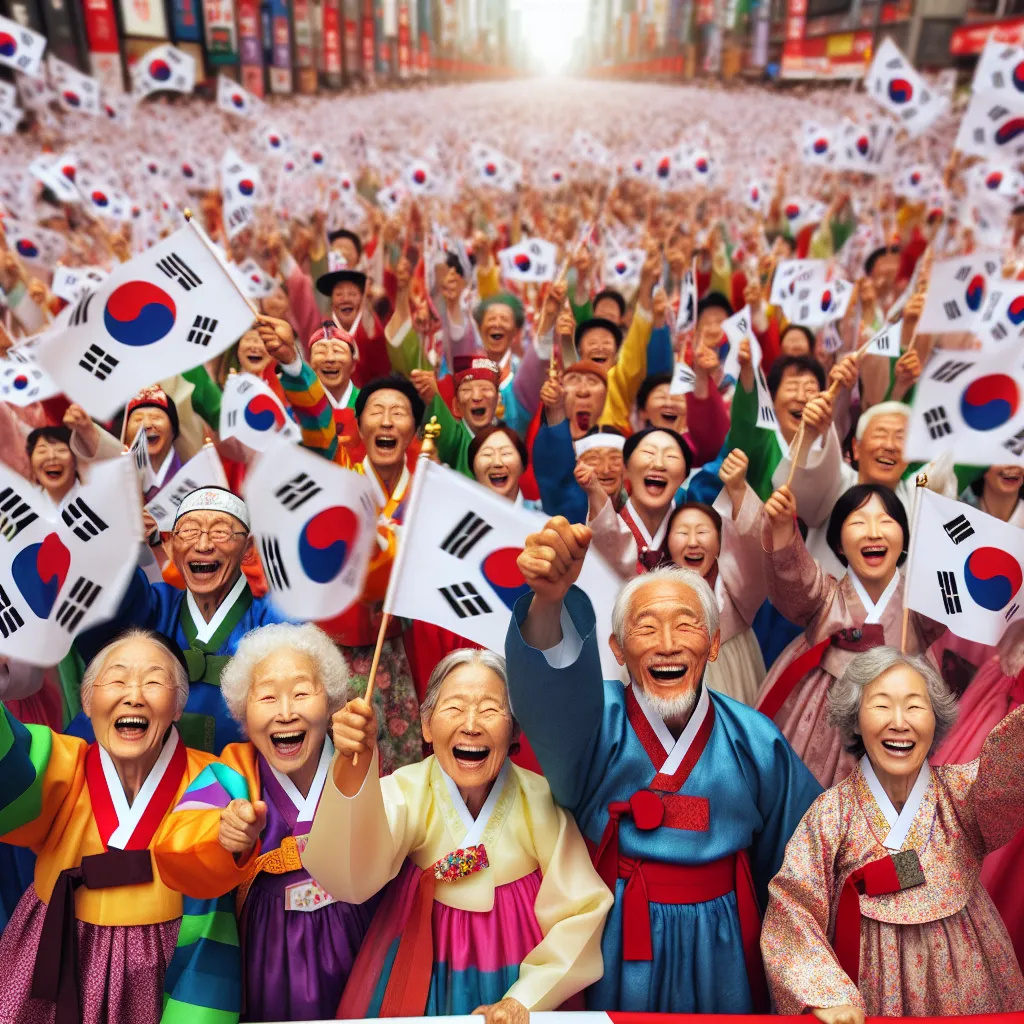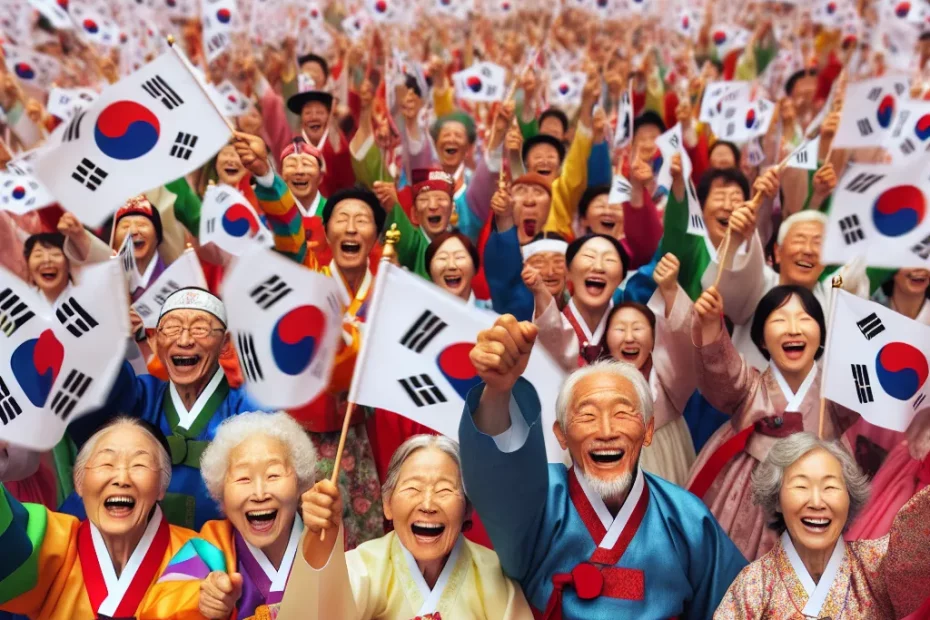On August 15th, Koreans around the world come together to commemorate National Liberation Day, a significant event marking Korea’s independence from colonial rule. This day holds immense historical importance, symbolizing the resilience and spirit of the Korean people in their fight for freedom. As we reflect on the journey to independence, it is crucial to recognize the sacrifices and struggles endured to achieve this milestone. Celebrations and traditions on National Liberation Day serve as a reminder of the hard-fought battles and the unwavering determination of the Korean nation. Let us honor this day with respect and gratitude for those who paved the way for Korea’s liberation.

The Significance of National Liberation Day
National Liberation Day, celebrated on August 15th each year, holds immense significance in Korean history. It marks the day when Korea gained independence from Japanese colonial rule in 1945. This day is a symbol of the Korean people’s resilience, bravery, and unwavering spirit in the face of adversity. 🇰🇷
The Symbol of Freedom
The liberation of Korea not only ended years of oppressive colonial rule but also paved the way for the country to rebuild itself and establish a strong foundation for democracy and freedom. It is a day to honor the sacrifices made by countless individuals who fought for the nation’s independence and to commemorate the hard-won freedom that we enjoy today. 🌟
Celebrations and Reminders
On National Liberation Day, various events and ceremonies are held across South Korea and in Korean communities around the world. These celebrations serve as a reminder of the importance of preserving our hard-earned freedom and of the need to continue striving for peace and unity on the Korean Peninsula. 🌏
Reflecting on Values
The significance of National Liberation Day extends beyond just a historical event; it is a day to reflect on the values of independence, democracy, and national pride. It serves as a reminder of the importance of upholding these values and of the responsibility we have to future generations to safeguard our freedom. 💪
As we commemorate National Liberation Day, let us remember the sacrifices of our ancestors, celebrate the progress we have made as a nation, and reaffirm our commitment to upholding the principles of liberty and justice for all. Happy National Liberation Day to all Koreans, both at home and abroad! 🎉
Historical Background of Koreas Independence
In the early 20th century, Korea found itself under Japanese colonial rule, a period marked by oppression and cultural assimilation. The struggle for independence was fueled by the desire to reclaim Korea’s sovereignty and preserve its rich heritage. The March 1st Movement in 1919, where millions of Koreans took to the streets to protest against Japanese rule, was a pivotal moment in the fight for independence. This movement sparked a wave of resistance and laid the foundation for the Korean independence movement.
The March 1st Movement
As the years passed, the Korean independence movement gained momentum, with underground resistance groups forming and actively working towards liberation. The Provisional Government of the Republic of Korea, established in Shanghai in 1919, served as a symbol of hope and unity for the Korean people. The government operated in exile, advocating for Korea’s independence on the international stage and coordinating resistance efforts within the country.
The outbreak of World War II presented an opportunity for Korea to break free from Japanese colonial rule. With Japan’s defeat in 1945, the Korean Peninsula was liberated, and the Korean people could finally breathe the air of freedom. However, this liberation was not without its challenges, as the division of Korea into North and South by the Allied powers laid the groundwork for the Korean War.
Despite the hardships and sacrifices endured during the struggle for independence, the Korean people’s unwavering spirit and determination ultimately led to the establishment of the Republic of Korea in the South and the Democratic People’s Republic of Korea in the North. The legacy of Korea’s independence movement serves as a reminder of the power of unity, resilience, and the enduring quest for freedom.
As we commemorate Korean National Liberation Day, let us honor the brave souls who fought for Korea’s independence and reflect on the sacrifices made to secure a brighter future for the Korean people. 함께 하나 되어 한국의 독립을 기념합시다!
Celebrations and Traditions on National Liberation Day
Commemorating Independence
On August 15th every year, South Korea commemorates National Liberation Day, also known as Gwangbokjeol, to celebrate the country’s independence from Japanese colonial rule. This significant day is marked by various festivities and traditions that honor the sacrifices made by those who fought for Korea’s freedom.
Raising of the Flag
One of the most iconic traditions on National Liberation Day is the raising of the South Korean flag, known as the Taegeukgi. The flag-raising ceremony is a solemn and patriotic event that symbolizes the country’s sovereignty and resilience. It serves as a reminder of the struggles endured during the independence movement and the importance of unity among the Korean people.
Grand Parades and Festivities
Another highlight of the celebrations is the grand parades that take place in major cities across South Korea. These parades feature colorful floats, traditional performances, and marching bands, creating a festive atmosphere that brings people from all walks of life together to rejoice in their shared history and culture.
Memorial Services and Cultural Performances
Throughout the day, solemn memorial services are held at various independence monuments and cemeteries to pay tribute to the independence fighters who made the ultimate sacrifice for their country. Cultural performances, including traditional music and dance shows, are also a key part of the National Liberation Day celebrations, showcasing the rich cultural heritage of Korea.
Traditional Activities and Customs
In addition to the official ceremonies and events, many Koreans take part in traditional activities such as wearing hanbok, the traditional Korean attire, and enjoying special traditional foods like tteokguk (rice cake soup) and jeon (Korean pancakes). These customs help to connect modern Koreans with their cultural roots and create a sense of continuity with the past.
Fireworks Display
As the day draws to a close, fireworks displays light up the night sky, symbolizing the hope and optimism for a bright future for South Korea. The colorful explosions in the sky serve as a fitting finale to a day filled with reflection, celebration, and unity.
On National Liberation Day, South Koreans come together to honor their history, celebrate their freedom, and look towards a future filled with promise and prosperity. It is a day of remembrance, gratitude, and national pride, reminding all Koreans of the sacrifices made to secure their independence and the importance of preserving their cultural heritage for generations to come.
Reflections on the Journey to Independence
As we commemorate Korean National Liberation Day, it is essential to reflect on the arduous journey that led to Korea’s independence. The struggle for liberation was not merely a historical event but a testament to the resilience and unwavering spirit of the Korean people.
The Quest for Freedom
Through years of occupation and oppression, the Korean people never lost sight of their ultimate goal: freedom. The quest for independence was marked by countless sacrifices, with brave individuals leading the charge for a sovereign Korea.
A Pivotal Moment
The year 1945 stands as a pivotal moment in Korean history, as the nation finally broke free from colonial rule. The proclamation of independence on August 15th marked the culmination of years of resistance and paved the way for a new era of self-determination.
Challenges and Sacrifices
The journey to independence was fraught with challenges and obstacles, yet the Korean people remained steadfast in their pursuit of freedom. The sacrifices made by those who fought for independence serve as a poignant reminder of the price that was paid for Korea’s sovereignty.
Today, as we celebrate Korean National Liberation Day, we honor the legacy of those who dedicated their lives to the cause of independence. Their courage and determination continue to inspire us as we strive to uphold the values of freedom and democracy.
Let us remember the sacrifices of the past and renew our commitment to building a better future for Korea. May the spirit of independence that burns brightly in the hearts of the Korean people continue to guide us towards a more prosperous and peaceful tomorrow.
As we reflect on the journey to independence, let us never forget the lessons of the past and the sacrifices that were made for the freedom we enjoy today. Korean National Liberation Day serves as a powerful reminder of the resilience and strength of the Korean people in the face of adversity. 함께 하나가 되어 독립을 위해 투쟁한 그 과거를 되새겨 더 나은 미래를 위해 함께 나아가기를 다짐합시다.
On Korean National Liberation Day, we commemorate the hard-fought independence of Korea and reflect on the sacrifices made by those who fought for freedom. This day holds immense significance in Korean history, serving as a reminder of the resilience and determination of the Korean people in the face of adversity. As we celebrate this day with various traditions and ceremonies, let us also take a moment to honor the journey to independence and the lessons it teaches us about the importance of preserving our national identity and sovereignty. National Liberation Day is not just a date on the calendar; it is a symbol of the unwavering spirit of the Korean people and a testament to their enduring commitment to freedom and independence.
